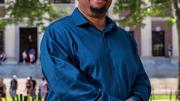As Harvard’s Muslim chaplain, Khalil Abdur-Rashid thinks of his work—including leading prayer each Friday, hosting seminars on Islamic ethics, and organizing community-building activities—as helping students to develop their “ ‘SQ,’ what I call their spiritual quotient.” In the process, he often finds himself helping them navigate multiple cultural identities. He knows what that’s like firsthand: his Muslim-convert parents raised him within a Southern Baptist extended family (“We did Ramadan, and we did Christmas”). They were active in education and politics in Atlanta, where he began his career as a social worker, investigating child-abuse cases for the state of Georgia. Then, 9/11 and its aftermath pushed him to explore his faith more deeply. He went abroad to Yemen and Turkey to study Islamic law before landing in a Ph.D. program at Columbia in 2010. There he also served as a religious-life adviser, commuting nearly two hours daily from Coney Island, where he was imam of a Brooklyn mosque. When news broke in 2012 of Muslim students being surveilled by the New York City Police Department, Abdur-Rashid spoke out, and was named to the police commissioner’s advisory council as a consultant on policy changes. Some months later, when three Jordanian students were violently threatened by a bus driver for speaking Arabic, he called up City Hall to demand action. “I was born and raised in a family of grassroots activists,” he says. But, in that moment, “I saw ‘oak tree activism.’ Activism from the institutional level, top down.” That experience informs Abdur-Rashid’s perspective on his current role. “There has to be somebody at the table, in the room, to advocate for students’ needs, who’s connected with major institutions,” he says. “That is the profoundness, I think, of this position.”
Khalil Abdur-Rashid, Muslim chaplain at Harvard
Khalil Abdur-Rashid, Muslim chaplain at Harvard
The University’s Muslim chaplain

Khalil Abdur-Rashid
Photograph by Jim Harrison
You might also like
Yesterday’s News
How a book on fighting the “Devill World” survived Harvard’s historic fire.
At Harvard’s Beck-Warren House, Ghosts Speak Many Languages
The quirky 1833 home now hosts Celtic scholars.
Yesterday’s News
A co-ed experiment that changed dorm life forever
Most popular
Explore More From Current Issue

At Harvard’s Beck-Warren House, Ghosts Speak Many Languages
The quirky 1833 home now hosts Celtic scholars.

Bees and Flowers Are Falling Out of Sync
Scientists are revisiting an old way of thinking about extinction.

Rabbi, Drag Queen, Film Star
Sabbath Queen, a new documentary, follows one man’s quest to make Judaism more expansive.




